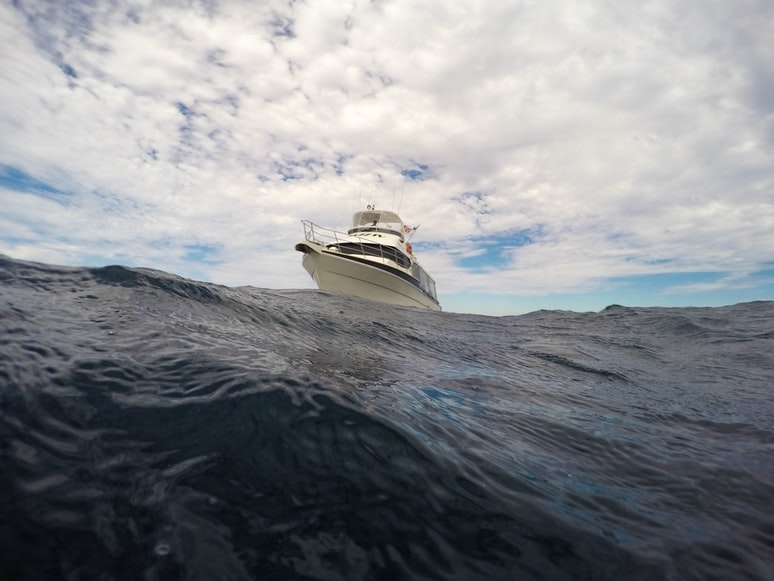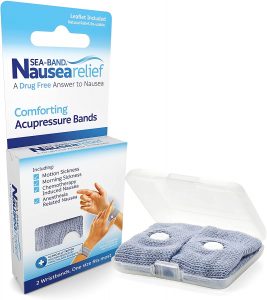How to avoid sea sickness.
By Captain Bill Jennings
We at Power Boating Canada have had over 36 years of boating with family and friends. In all that time I’ve only encountered maybe 3 people who have gotten sick out of about 500! Once during a Poker Run event, a participant’s wife was experiencing sea sickness. They asked me how to prevent it, and how to feel better. These tips will be mentioned throughout your read.
Three little words you never want to hear when boating is, “I feel sick”.

If you have never experienced sea sickness, I can tell you that it is comparable to “death by ice pick”, so a little empathy is in order. But with some inside knowledge, you can change bad news to happy cruise.
Motion, or ‘sea sickness’, is caused by a disconnect between what your eyes are seeing and what your other senses are feeling. If what your eyes are seeing matches the information sent to your brain from the fluid in your inner ear, there is no cause for vertigo. If it doesn’t, you will experience a disconnect that can trigger nerve spasms, or motion sickness.
It is easier to prevent this condition, than to cure it. Prior to boating, make sure to eat bland foods and drink plenty of water. Ginger has also been shown to be beneficial.

Some full day boaters recommend Scopolamine patches that are applied behind the ear. Your local drug store should have all of these items.
Once on the water, there are several steps you can take to ease the effects of motion sickness. A boater who is prone to sea sickness, should face forward and look at a fixed point of reference on the horizon. At the same time, keep the head level and allow the body from the neck down to take up the motion of the boat. Breathe deeply and take in plenty of fresh air.
An easy to apply method that I have found works, is the application of acupressure bracelets. These are basically elastic wrist bands with beads attached to the inside. The beads when pressuring against the inside of your wrist, put pressure on certain nerves and reduce dizziness. You can accomplish the same relief by applying pressure with one of your fingers to the inside of your wrist. Ice cubes behind the ear can also help to stabilize balance. And for many people, all it takes to relieve nausea is a whiff of rubbing alcohol.
There are several preventative drugs that work well including:
• Gravol
• Dramamine
• Phenergan
• Bonine
If you boat a lot, your optometrist can prescribe special glasses that have an artificial horizon in the lens. But a simpler solution would be to condition yourself to handle the motion of boating. While onshore, hold your head still and roll your eyes slowly upward, then slowly straight down, focusing on an object at the limit of each roll. Do this twenty times and perform the same movement side to side and with the head up and down. Shift weight from one leg to the other for several minutes, with your eyes closed. Practised regularly it has been shown that these exercises will very much reduce an individual’s propensity for onboard sickness.
The next time you or your passenger experience motion sickness, try one of these steps. They should do the trick, but even if they don’t, the performance of all your efforts could distract your patient to the point where they won’t notice their dizziness.
Keyword : best boat, Best boat buying website, best boat marina website, best boat travel website, best place to rent a boat, boat, boat accessories, boat angler, boat boondocking, boat buyers guide, boat camper, boat camping, boat dealers, boat DIY, boat Fishing, boat Fixer, boat Home, boat information, boat insurance, Boat Maintenance, boat marinas, boat marinas in Alberta, boat marinas in BC, boat marinas in Canada, boat marinas in Manitoba, boat marinas in Saskatchewan, boat marinas in the USA, boat marinas near me, boat products, boat rentals, boat repair, boat road test, boat sharing, boat sites near me, boat supplies, boat Tech, boat tips, boat touring, boat trade, boat Travel, boat traveling, boat travelling, boat vacation, boat vacation cost, boat websites Canada, Boating, boating Canada, Boating Canada’s Boat Lifestyle Magazine, Boating Lifestyle Magazine, boating website, Canadian marina websites, dizziness, expert boat information, find a boat dealer, gravol, how much does a boat cost, how much does marina cost, how to choose a boat, how to drive a boat, marina products, marina supplies, motion sickness, motor boat, nausea, power boating magazine, relief, seasick, top boat website, used boat reviews best boat, Best boat buying website, best boat marina website, best boat travel website, best place to rent a boat, boat, boat accessories, boat angler, boat boondocking, boat buyers guide, boat camper, boat camping, boat dealers, boat DIY, boat Fishing, boat Fixer, boat Home, boat information, boat insurance, Boat Maintenance, boat marinas, boat marinas in Alberta, boat marinas in BC, boat marinas in Canada, boat marinas in Manitoba, boat marinas in Saskatchewan, boat marinas in the USA, boat marinas near me, boat products, boat rentals, boat repair, boat road test, boat sharing, boat sites near me, boat supplies, boat Tech, boat tips, boat touring, boat trade, boat Travel, boat traveling, boat travelling, boat vacation, boat vacation cost, boat websites Canada, Boating, boating Canada, Boating Canada’s Boat Lifestyle Magazine, Boating Lifestyle Magazine, boating website, Canadian marina websites, dizziness, expert boat information, find a boat dealer, gravol, how much does a boat cost, how much does marina cost, how to choose a boat, how to drive a boat, marina products, marina supplies, motion sickness, motor boat, nausea, power boating magazine, relief, seasick, top boat website, used boat reviews
